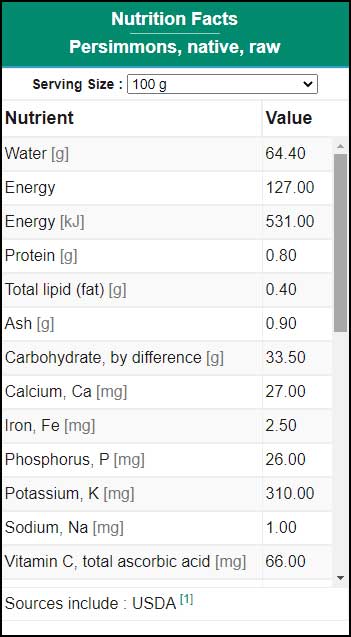Persimmons are delicious, exotic fruits that have a wealth of health benefits packed inside them. They are more than just a sweet and tasty treat; they have health benefits ability to improve eye health, reduce signs of aging, improve digestion, boost your immune system, lower blood pressure, and take care of your skin. Furthermore, they can help reduce inflammation and increase blood circulation throughout the body.
 |
| The persimmons are also called the sharon fruit. Photo Credit: Shutterstock |
What Are Persimmons?
Persimmons are orange or reddish-brown colored fruits, which are shaped like small, flat tomatoes. They are known to have a sweet and textured flavor. There are usually two kinds of persimmons – astringent and non-astringent varieties. Astringent persimmons are high in plant chemicals known as tannins; these tend to give the unripe version of the fruit a bitter, dry taste. One must wait for astringent persimmons to ripen to eat them. Non-astringent, on the other hand, is a variety, which is also rich in tannins but can be eaten unripe.
Persimmons belong to the scientific family, Diospyros. As more information about ancient cultures has emerged, thanks to anthropology and archaeology, different types of persimmons have been classified into the following:
All of these persimmons share much of the same basic nutritional value and health benefits, with a few notable differences, like fiber content and trace amounts of unusual organic compounds. There are a number of common names and nicknames for persimmons, including “Jove’s fire,”- “The Fruit of the Gods” – and “Nature’s Candy”. Persimmons can be eaten fresh, dried, raw, or cooked, each method changes the flavor, but they are generally sweet and pulpy. If allowed to ripen fully, the flesh can almost be scooped out with a spoon.
Nutritional Value of Persimmons
As per USDA National Nutrient Database, persimmons are rich in vitamin A, vitamin C, vitamin E, and B-vitamins (especially vitamin B6), as well as dietary fiber, manganese, copper, magnesium, potassium, and phosphorous. According to a report on this fruit in the journal Experimental and Clinical Sciences, persimmons also contain other organic compounds. These include catechins, carotenoid compounds, and others, many of which contribute to their added health benefits. [2] [3]
Health Benefits of Persimmons
Let us look at the health benefits of persimmons in detail below:
Anti-Cancer Properties
This delicious little fruit is packed with antioxidants, the anti-cancer agents that can boost your body’s ability to fight free radicals, improve overall health and protect against many diseases. Free radicals are the by-products of cellular metabolism that can mutate healthy cells into cancerous ones and damage various organ systems. One study published in the Korean Journal of Nutrition explored the anticancer impact of persimmon leaf extracts on human gastric cancer cells. It concluded that persimmon leaf extracts revealed strong anticancer potential. However, more research on the effects of this fruit is needed. [4]
As mentioned, persimmons have high levels of vitamin C and A, beta-carotene [5], flavonoids as well as phenolic compounds – like catechins and gallocatechin – which are linked to anti-cancer effects. Dr. Naresh Kumar, Dr. Masood Sadiq Butt, and colleagues published a study in Experimental and Clinical Sciences Journal suggesting that this fruit possesses carotenoids and catechins that hold anticancer perspectives against various cancer cell lines. [6] [7]
Boost Immunity
Persimmons, a vitamin C containing help boost immunity due to the presence of vitamin C. They have one of the highest ascorbic acid (vitamin C) content among other fruits and a single persimmon has approximately 80 percent of the daily requirement of this beneficial nutrient. One study published in the Journal of Food Quality noted that Vitamin C stimulates the immune system and increases the production of white blood cells, which are the primary line of defense for the body against microbial, viral, and fungal infections, as well as foreign bodies or toxins. [8]
Aids in Digestion
Like most fruits, persimmons are a good source of fiber, containing almost 20% of the daily requirement in a single serving. Fiber helps the body process food in a more efficient way by adding bulk to the stool, stimulating peristaltic motion to move the food through the digestive tract, increasing secretions of gastric and digestive juices, and relieving symptoms of constipation and diarrhea. Overall, a high-fiber fruit like persimmon can be a major boost to your gastrointestinal system and can protect you from colorectal cancer and other similar diseases. It can also help people lose weight by defending them against lipid uptake, which can cause obesity. A study in the Journal of Nutritional Biochemistry stated that fruits like persimmon rich in dietary fiber may improve lipid metabolism and prevent the oxidation of low-density lipoprotein cholesterol (LDL-C). [9]
Persimmons are rich in a number of vitamins and minerals, in particular vitamin A, beta-carotene, lutein, lycopene, and cryptoxanthin. These vitamins function as antioxidants in the body to reduce oxidative stress, which can in turn help diminish signs of premature aging, like wrinkles, age spots, fatigue, and others. A team of Japanese researchers published a study that supports the protective potential of a certain kind of polyphenol found in persimmon peel, which plays a crucial role against oxidative damage under the aging process. [10]
Improves Vision
The compounds in persimmons also have a benefit for the health of your eyes! One common compound, the carotenoid alcohol zeaxanthin is found from B-complex vitamins. Persimmons are packed with this class of vitamins. According to Dr. Kwak-Wai Lam and Dr. Paul But’s study, zeaxanthin has a direct link to improved eye health due to its behavior as an antioxidant substance. It further states that this compound has the potential for assisting with reducing associated conditions, such as macular degeneration, cataracts, and night blindness. [11]
Control Blood Pressure
Potassium is another mineral found in significant quantities in persimmons. Potassium can act as a vasodilator -blood pressure lowering agent – thereby increasing blood flow to various parts of the body. Low blood pressure may also help to reduce strain on the cardiovascular system and prevent various cardiac-related conditions.
A 2012 study published in the journal Food, Science, Technology Reserve investigated if there were any Dr. Chin Fang Liu, Dr. Shizue Kurakane, et al, published a study in the Food, Science Technology Reserve, in which they investigated the antihypertensive effects of unripe persimmons in spontaneously hypertensive rats. The study showed that when the rats were fed the fruit for 2-3 days, there was a drop in their blood pressure. While the initial results are promising, more scientific evidence and studies are required to support this claim. [12]
Regulate Blood Circulation
Along with lowering blood pressure, persimmons provide copper, an essential element in creating new red blood cells. Without copper, you cannot uptake various essential nutrients to make additional hemoglobin. Increased circulation of healthy red blood cells is a boon to health for a number of reasons, including helping to increase cognitive function, muscle tone, metabolism, and energy levels, as well as wound repair and cellular growth. [13]
A team of Korean researchers published in the Journal of Medicinal Food revealed the possible beneficial effects of the ethanol extract of persimmon tree leaves on the blood circulation and lipid metabolism in rats, who are fed a high-fat diet. The study revealed that persimmons have the potential to improve circulation by hampering blood clotting and platelet activation and by bringing down the plasma cholesterol levels. However, further detailed studies are required to explore this particular health benefit. [14]
Improves Metabolic Activity
Persimmons contain elements of the B complex of vitamins like pyridoxine, folic acid, and thiamin, which are all essential parts of various enzymatic processes and metabolic functions throughout the body. B-vitamins, in combination with all of the essential vitamins and minerals for health, ensure that your body’s systems function efficiently and effectively. A study published in the Scientific Reports Journal found that that dietary beta-carotene had an “inverse association with the risk of all-mortality”. Further studies are needed to enhance these findings, however as persimmon contains these b-vitamins, they may also assist in this reduction in comorbid. [15]
How to Eat Persimmons?
Persimmons can be eaten fresh, dried, raw, or cooked, each method changes the flavor, but they are generally sweet and pulpy. If allowed to ripen fully, the flesh can almost be scooped out with a spoon.
There is also a misconception of allowing them to ripen almost to a rotting state, but in reality, you should allow them to ripen until they are fully soft and pulpy.
Word of Caution: Persimmons consist of flavonoid antioxidants and tannins, that are beneficial for heart health, blood pressure, and cholesterol levels. A group of Turkish researchers conducted a study on rats that showed that tannic acid and gallic acid, both found in persimmons, are effective at lowering high blood pressure. However, too much persimmons may lower blood pressure significantly, so avoid intake if you are hypotensive. [16]
Enjoy these delectable fruits and the health benefits they will confer on you!
Important Notice: This article was originally published at www.organicfacts.net by John Staughton (BASc, BFA) where all credits are due. Medically reviewed by Vanessa Voltolina (MS, RD).
Disclaimer
The watching, interacting, and participation of any kind with anything on this page does not constitute or initiate a doctor-patient relationship with Dr. Farrah®. None of the statements here have been evaluated by the Food and Drug Administration (FDA). The products of Dr. Farrah® are not intended to diagnose, treat, cure, or prevent any disease. The information being provided should only be considered for education and entertainment purposes only. If you feel that anything you see or hear may be of value to you on this page or on any other medium of any kind associated with, showing, or quoting anything relating to Dr. Farrah® in any way at any time, you are encouraged to and agree to consult with a licensed healthcare professional in your area to discuss it. If you feel that you’re having a healthcare emergency, seek medical attention immediately. The views expressed here are simply either the views and opinions of Dr. Farrah® or others appearing and are protected under the first amendment.
Dr. Farrah® is a highly experienced Licensed Medical Doctor certified in evidence-based clinical nutrition, not some enthusiast, formulator, or medium promoting the wild and unrestrained use of nutrition products for health issues without clinical experience and scientific evidence of therapeutic benefit. Dr. Farrah® has personally and keenly studied everything she recommends, and more importantly, she’s closely observed the reactions and results in a clinical setting countless times over the course of her career involving the treatment of over 150,000 patients.
Dr. Farrah® promotes evidence-based natural approaches to health, which means integrating her individual scientific and clinical expertise with the best available external clinical evidence from systematic research. By individual clinical expertise, I refer to the proficiency and judgment that individual clinicians acquire through clinical experience and clinical practice.
Dr. Farrah® does not make any representation or warranties with respect to the accuracy, applicability, fitness, or completeness of any multimedia content provided. Dr. Farrah® does not warrant the performance, effectiveness, or applicability of any sites listed, linked, or referenced to, in, or by any multimedia content.
To be clear, the multimedia content is not intended to be a substitute for professional medical advice, diagnosis, or treatment. Always seek the advice of your physician or other qualified health providers with any questions you may have regarding a medical condition. Never disregard professional medical advice or delay in seeking it because of something you have read or seen in any website, video, image, or media of any kind.
Dr. Farrah® hereby disclaims any and all liability to any party for any direct, indirect, implied, punitive, special, incidental, or other consequential damages arising directly or indirectly from any use of the content, which is provided as is, and without warranties.









